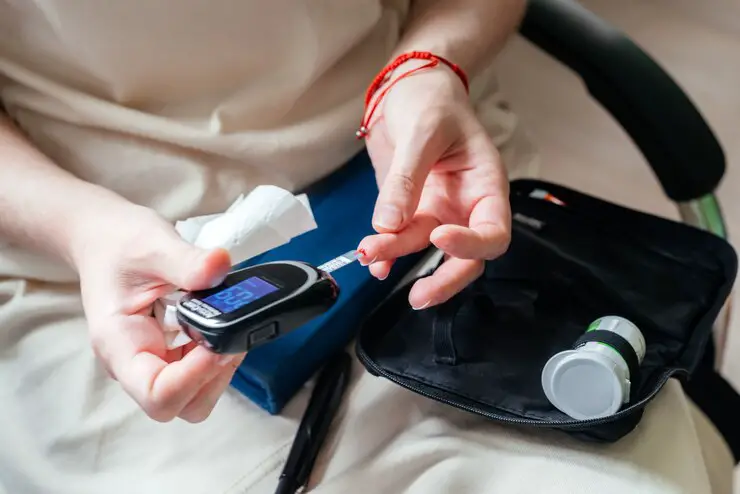
Diabetes presents numerous challenges in day-to-day life, but having the right tools and supplies at your disposal can make managing the condition significantly easier. The correct supplies can help maintain healthy blood sugar levels, minimize the risk of complications, and enhance your ability to deal with unexpected health issues.
In this article, we will discuss six essential diabetes supplies that every person with diabetes should keep at home and why they are so crucial. Being prepared is particularly important for individuals with chronic health conditions like diabetes, as it ensures better control over the condition and can prevent emergencies.
We will also guide you on creating a personalized diabetic emergency kit, so you’re always ready to handle any diabetes-related challenge effectively.
-
Blood Glucose Monitoring Kit
Monitoring blood sugar levels is a cornerstone of diabetes management. It helps you understand when your blood sugar is high or low, enabling you to take the necessary actions promptly. A comprehensive blood glucose monitoring kit typically includes:
- Glucose Monitor: Provides quick readings, usually within five seconds.
- Testing Strips: Collects blood samples for testing.
- Lancets: Used to make small punctures on the skin to obtain blood samples.
- Carrying Case: Keeps all the components organized and portable.
Most glucose monitors come with a memory feature that tracks your previous readings, and some even provide daily average sugar levels. For those with vision problems, there are glucose meters with voice functions that guide you through the testing process and read out the results.
-
Emergency Food Supplies
It is crucial for people with diabetes to always have diabetes-friendly foods on hand. Sudden drops in blood sugar levels can be life-threatening, so having quick access to the right foods is essential. In the same way fast fast-acting food supplies can be a real life-savor in case of emergencies. Some emergency food supplies that help maintain blood sugar levels include:
- Low-Sugar Drinks: Water, green tea, or diabetic juices to stay hydrated and your sugar levels balanced.
- Healthy Snacks: Foods like nuts that can be consumed between meals. Diabetic snack ranges offered by certain brands are also a smart choice.
- Fast-Acting Sugar Sources: Glucose tablets, orange or apple juice, or regular soda to quickly raise blood sugar levels when they drop. Avoid chocolate as it takes longer to digest.
-
Insulin Essentials
If you require regular insulin injections, ensure you always have the following supplies available:
- Insulin: Store unopened insulin bottles in the refrigerator. Before using, bring the insulin to room temperature to reduce irritation and pain. Opened insulin bottles can be kept at room temperature for up to a month, after which they should be discarded.
- Syringes: Buy syringes in bulk to ensure you always have a supply on hand. Some syringes come with magnifying lenses to make reading dosages easier.
- Needles: Like syringes, needles can also be purchased in bulk. Safety guards for needles can help keep them steady during injections.
- Sharps Container: For safe disposal of used needles. If you don’t have a sharps container, use a heavy-duty plastic bottle with a cap.
- Glucagon Shot Kits: Essential for insulin users, keeping at least two glucagon shot kits available at all times is vital. Glucagon helps restore normal blood glucose levels in case they drop dangerously low.
-
Foot Care Supplies
Proper foot care is critical for people with diabetes due to the increased risk of foot complications. Diabetes can cause a number of problems with the feet, making foot care supplies essential. High blood sugar levels can damage foot nerves, causing diabetic neuropathy, which leads to a loss of sensation.
This makes it hard to notice injuries, increasing the risk of serious infections. Additionally, diabetes can impair blood circulation, slowing the healing of cuts and sores and raising the risk of ulcers and gangrene.
Nerve damage can also cause muscle weakness, resulting in foot deformities like hammertoes, bunions, and Charcot foot, where foot bones weaken and fracture easily.Essential foot care supplies include:
- Orthopedic Footwear: Specially designed shoes can help alleviate discomfort and prevent foot problems. These shoes offer better support and cushioning to protect against blisters, calluses, corns, and other common issues.
- Seamless, Padded Socks: These socks reduce the risk of friction and pressure, which can cause blisters and sores. They are particularly useful for those with nerve damage who may not feel minor irritations that can lead to bigger problems.
- Toenail Scissors and Nail File or Emery Board: Proper nail care is crucial for preventing ingrown toenails and infections. Using dedicated tools helps keep your nails trimmed and reduces the risk of injury.
-
Skin Care Supplies
People with diabetes are more prone to skin issues, making proper skin care essential. High blood sugar levels can cause the skin to become dry, itchy, and prone to infections. Moreover, diabetes can impair blood circulation and nerve function, particularly in the extremities, leading to a higher risk of wounds and infections that heal slowly.
Having the right skin care supplies helps manage these risks effectively.Essential skin care supplies include:
- Skin Moisturizer: Regular use of a good moisturizer helps keep the skin hydrated and prevents dryness and cracking, which can lead to infections. It’s crucial to choose a moisturizer that is gentle and suitable for sensitive skin.
- Mild Moisturizing Soap: Using a mild soap helps prevent skin irritation and dryness. Harsh soaps can strip the skin of natural oils, exacerbating dryness.
- Mild Shampoo: Keeping the scalp healthy is important, as scalp conditions can also arise from diabetes-related skin issues.
- Antibiotic Ointment or Cream: This is essential for treating minor cuts, scrapes, or wounds to prevent infections. Diabetics are at a higher risk for infections due to slower healing processes.
- Sterile Gauze, Cloth Bandages, or Paper Tape: These supplies are necessary for covering and protecting wounds to keep them clean and promote faster healing.
-
Dental Care Supplies
Proper dental care is critical for people with diabetes, as they are more susceptible to gum disease and other dental issues. Diabetes can lead to higher glucose levels in saliva, creating a breeding ground for bacteria that cause gum disease.
Additionally, diabetes can reduce the body’s ability to fight infection, making it easier for oral health problems to develop and progress. Essential dental care supplies for diabetics include:
- Soft-Bristled Toothbrush: A toothbrush with soft, rounded bristles is less likely to harm the gums than one with stiff bristles. This helps prevent gum irritation and bleeding.
- Fluoride Toothpaste: Strengthens tooth enamel and helps prevent decay, which is especially important for diabetics who may be more prone to cavities.
- Dental Floss: Essential for removing plaque and food particles from between teeth and below the gum line, helping to prevent gum disease.
- Antiseptic Mouthwash: Using mouthwash daily can reduce oral bacteria, promote gum health, and prevent infections.
Regular dental check-ups are crucial for early detection and management of dental issues. Replace your toothbrush every 3 to 4 months, or sooner if the bristles become worn, to ensure effective cleaning and gum care.
Management is the Key
Proper diabetes management requires having the right supplies and tools readily available. These essential supplies not only help maintain healthy blood sugar levels but also prepare you to handle unexpected health issues effectively.
By being proactive and prepared, you can manage your diabetes better and lead a healthier, more stable life. Regular check-ups, a balanced diet, and a well-stocked supply of essential diabetes tools and supplies are key to effectively managing your condition and avoiding emergencies.



